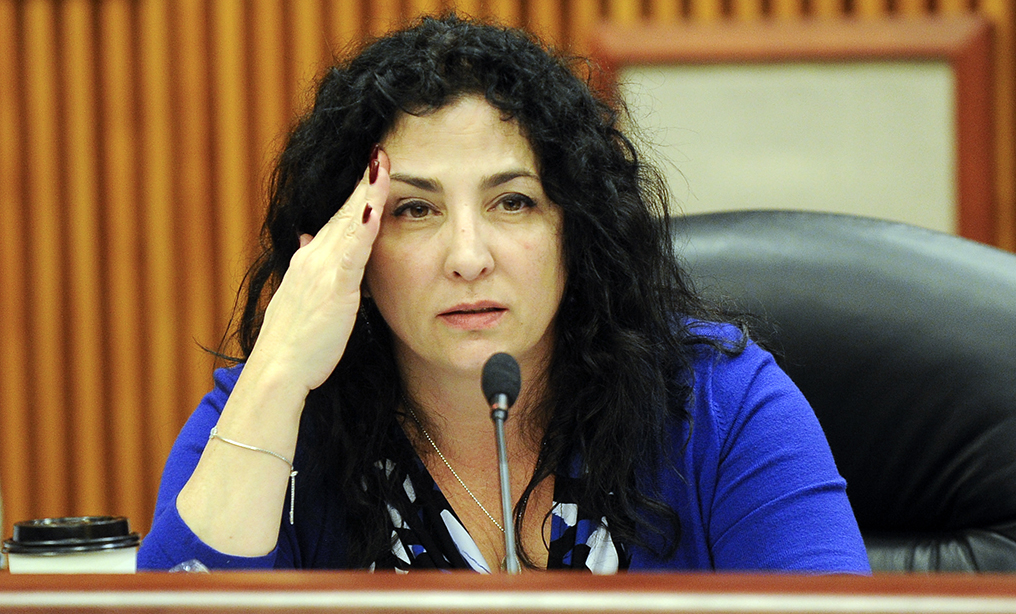Legislation to Allow Family Contact After Termination of Parental Rights Expected to Move
Sponsors of a bill that would allow family court judges to grant contact between children and their parents after termination are pushing their colleagues to support the legislation before they're scheduled to leave Albany for the year in June.
May 10, 2019 at 03:28 PM
6 minute read
 Sen. Diane Savino, D-Staten Island, co-sponsor of the new bill (Photo: Hans Pennink)
Sen. Diane Savino, D-Staten Island, co-sponsor of the new bill (Photo: Hans Pennink)
State law in New York prevents family court judges from allowing any kind of contact between a parent and their child after parental rights have been terminated, but lawmakers are renewing a push to change that in the final weeks of this year's legislative session.
 Assemblywoman Latoya Joyner, D-Bronx
Assemblywoman Latoya Joyner, D-BronxSponsors of a bill that would allow family court judges to grant contact between children and their parents after termination are pushing their colleagues to support the legislation before they're scheduled to leave Albany for the year in June.
They rallied with attorneys this week in Albany, where the bill is currently under consideration by state lawmakers. It's scheduled to come up for a vote in the Senate Committee on Children and Families on Tuesday. The bill will likely be approved, after which it would be closer to a vote on the Senate floor.
Lawmakers in the Assembly have already moved the bill through committee, meaning it could come to the floor for a vote at anytime in the lower chamber. Assemblywoman Latoya Joyner, D-Bronx, said they're just waiting on a date for the vote.
She's sponsored the bill with State Sen. Diane Savino, D-Staten Island, for the past two years. Joyner's passion for the legislation came, in part, from her own personal story, she said.
Her sister was placed in foster care when she was 5 years old, after which she had “vivid and fond” memories of their biological parents, Joyner said. Joyner, meanwhile, was placed in foster care at birth. Her sister didn't have contact with their biological parents again until she found them later in her adult life, Joyner said.
“My sister spent her entire life searching for her biological parents and ultimately found us all,” Joyner said. “I can't tell you the emotional rollercoaster we all went through when we were reunited, but what I can tell you is that after we all found each other we developed a better sense of self.”
Savino also has personal experience in the matter. She started her career as a caseworker, during a time when the system was more flexible about contact between children and parents whose rights have been terminated, she said.
Federal law, which Savino likened to a “brick wall,” mandates that if a child is placed in foster care and remains there for a certain amount of time, the goal for caseworkers is no longer to reunify families, she said. Instead, it's to terminate an individual's parental rights, which would bar any sort of contact between that person and their child.
“Now we have children who are in foster care whose mothers and fathers are desperately working toward reunification, trying to meet the demands placed upon them by family court judges, trying to get their lives back together, and they run into a brick wall that was imposed upon them by Washington,” Savino said.
But the bill isn't solely a response to federal law, or the personal experiences of families in New York. It's also the legislative answer, its sponsors said, to a decision from the New York Court of Appeals in 2012 on the issue.
The case, called Matter of Hailey ZZ, involved a child whose father's parental rights had been terminated after being sent to prison. The trial court then denied a request from the father to have continued visitation with the child, saying that a section of the state's social services law did not allow the judge to grant the request. The Court of Appeals affirmed that decision.
“Absent legislative warrant, Family Court is not authorized to include any such condition in a dispositional order made pursuant to Social Services Law Section 384-b,” the court's decision said.
Now, Joyner and Savino are trying to provide that legislative warrant.
The bill would give discretion to family court judges as to whether allowing contact with parents whose rights have been terminated or siblings would be in a child's best interest.
There are no specific factors listed in the legislation that judges would have to consider when deciding whether contact is in the best interest of the child. Savino said they would look at things like the bond established before termination, and whether the parent may have some sort of issue that would make contact detrimental to the child.
“This would not apply in every case,” Savino said. “There are some situations where it's not in the best interest of the child to have a relationship with a parent. Sadly, that's a reality.”
The level of visitation allowed between the child and that person would also be up to the judge, according to the proposal. Judges could allow physical visitation between children and those individuals, but they could also limit the contact to telephone calls, social media and even letters.
The measure is supported by several defense attorney and family representation organizations, including the Bronx Defenders, Brooklyn Defender Services, Legal Aid Society, Lawyers for Children and more. Dawne Mitchell, attorney-in-charge of the Legal Aid Society juvenile rights practice, said the bill would be as beneficial to children as it would be to the parents seeking contact with them.
“Long-standing relationships with family members cannot simply be erased without detriment to the child,” Mitchell said. “Indeed, the ability to maintain family ties can provide children in the child welfare system with the sense of security they need to develop healthy attachments and thrive.”
Lauren Shapiro, director of Brooklyn Defenders Services' Family Defense Practice, was in Albany this week to push the bill. She said much of the same and urged lawmakers to take it up as soon as possible.
“This set of reforms will help countless families across New York state facing unfair and disproportionate harm as a result of their involvement with the child welfare system,” Shapiro said.
Family Court Justice Sarah Cooper from the Bronx, who is the current president of the New York State Family Court Judges Association, declined to comment on the legislation. She said the group hadn't considered it and would have to discuss the bill before taking a position.
Lawmakers have the next six weeks to bring the bill to the floor for a vote before they're scheduled to leave Albany for the year. The legislative session is scheduled to end June 19.
READ MORE:
Ex-Felons Could Be Eligible for Jury Duty Under NY Bill That Has Cleared Senate
NY Bill Would Bar Life Insurers From Eyeing Applicants' Opioid-Blocker Prescriptions
This content has been archived. It is available through our partners, LexisNexis® and Bloomberg Law.
To view this content, please continue to their sites.
Not a Lexis Subscriber?
Subscribe Now
Not a Bloomberg Law Subscriber?
Subscribe Now
NOT FOR REPRINT
© 2025 ALM Global, LLC, All Rights Reserved. Request academic re-use from www.copyright.com. All other uses, submit a request to [email protected]. For more information visit Asset & Logo Licensing.
You Might Like
View All

Federal Judge Pauses Trump Funding Freeze as Democratic AGs Plan Suit
4 minute read
Relaxing Penalties on Discovery Noncompliance Allows Criminal Cases to Get Decided on Merit
5 minute read
Bipartisan Lawmakers to Hochul Urge Greater Student Loan Forgiveness for Public-Interest Lawyers
Trending Stories
- 1States Accuse Trump of Thwarting Court's Funding Restoration Order
- 2Microsoft Becomes Latest Tech Company to Face Claims of Stealing Marketing Commissions From Influencers
- 3Coral Gables Attorney Busted for Stalking Lawyer
- 4Trump's DOJ Delays Releasing Jan. 6 FBI Agents List Under Consent Order
- 5Securities Report Says That 2024 Settlements Passed a Total of $5.2B
Who Got The Work
J. Brugh Lower of Gibbons has entered an appearance for industrial equipment supplier Devco Corporation in a pending trademark infringement lawsuit. The suit, accusing the defendant of selling knock-off Graco products, was filed Dec. 18 in New Jersey District Court by Rivkin Radler on behalf of Graco Inc. and Graco Minnesota. The case, assigned to U.S. District Judge Zahid N. Quraishi, is 3:24-cv-11294, Graco Inc. et al v. Devco Corporation.
Who Got The Work
Rebecca Maller-Stein and Kent A. Yalowitz of Arnold & Porter Kaye Scholer have entered their appearances for Hanaco Venture Capital and its executives, Lior Prosor and David Frankel, in a pending securities lawsuit. The action, filed on Dec. 24 in New York Southern District Court by Zell, Aron & Co. on behalf of Goldeneye Advisors, accuses the defendants of negligently and fraudulently managing the plaintiff's $1 million investment. The case, assigned to U.S. District Judge Vernon S. Broderick, is 1:24-cv-09918, Goldeneye Advisors, LLC v. Hanaco Venture Capital, Ltd. et al.
Who Got The Work
Attorneys from A&O Shearman has stepped in as defense counsel for Toronto-Dominion Bank and other defendants in a pending securities class action. The suit, filed Dec. 11 in New York Southern District Court by Bleichmar Fonti & Auld, accuses the defendants of concealing the bank's 'pervasive' deficiencies in regards to its compliance with the Bank Secrecy Act and the quality of its anti-money laundering controls. The case, assigned to U.S. District Judge Arun Subramanian, is 1:24-cv-09445, Gonzalez v. The Toronto-Dominion Bank et al.
Who Got The Work
Crown Castle International, a Pennsylvania company providing shared communications infrastructure, has turned to Luke D. Wolf of Gordon Rees Scully Mansukhani to fend off a pending breach-of-contract lawsuit. The court action, filed Nov. 25 in Michigan Eastern District Court by Hooper Hathaway PC on behalf of The Town Residences LLC, accuses Crown Castle of failing to transfer approximately $30,000 in utility payments from T-Mobile in breach of a roof-top lease and assignment agreement. The case, assigned to U.S. District Judge Susan K. Declercq, is 2:24-cv-13131, The Town Residences LLC v. T-Mobile US, Inc. et al.
Who Got The Work
Wilfred P. Coronato and Daniel M. Schwartz of McCarter & English have stepped in as defense counsel to Electrolux Home Products Inc. in a pending product liability lawsuit. The court action, filed Nov. 26 in New York Eastern District Court by Poulos Lopiccolo PC and Nagel Rice LLP on behalf of David Stern, alleges that the defendant's refrigerators’ drawers and shelving repeatedly break and fall apart within months after purchase. The case, assigned to U.S. District Judge Joan M. Azrack, is 2:24-cv-08204, Stern v. Electrolux Home Products, Inc.
Featured Firms
Law Offices of Gary Martin Hays & Associates, P.C.
(470) 294-1674
Law Offices of Mark E. Salomone
(857) 444-6468
Smith & Hassler
(713) 739-1250






